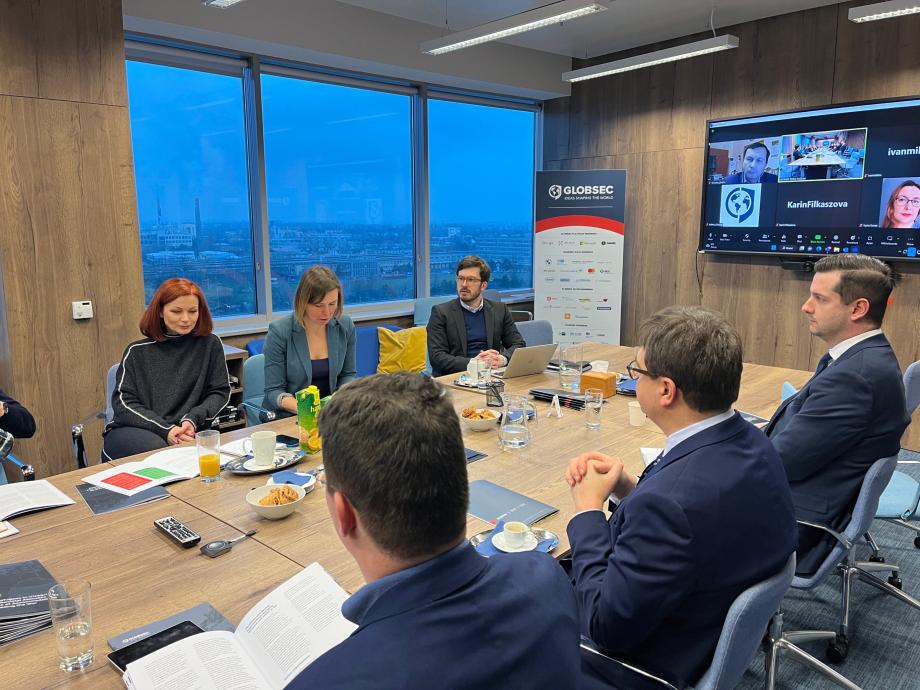Ukraine Experts Brief International Audience

Against the backdrop of the recent Ramstein eight meeting and the news of Western made tanks being delivered to Ukraine, GLOBSEC organized a briefing session on the release of its recent reports Five Security Scenarios on Russian War in Ukraine for 2022 – 2023 and Ukrainian refugees in Visegrad countries: Societal Attitudes and Challenges of Accommodating People Fleeing the War.
Led by members of GLOBSEC’s Ukraine programme, including Iuliia Osmolovska, Hennadiy Maksak, and Zoriana Mischuk, Roman Vlaskenko, respectively they provided timely analysis to a diverse set of stakeholders, in-person and online, that served to expand the insight of audience members on both hard security and soft power issues. Notable audience members included Slovak Parliamentarians and foreign embassy personnel.
The briefings provided clarity on a range of complex issues that emphasized the local, regional, and global implications of Russia’s invasion. A spirited question and answer session followed suit that looked to address the current developments and how it related to the current data sets.
As echoed by Marcin Zaborowski, briefing moderator, this war has confirmed and amplified the interconnectedness between hard and soft security issues that continue to be a distressing issue for Ukraine. This emerging by-product requires constant vigilance by authorities in Ukraine and western supporters, as well as further researcher to address recommendations.
Notable Data Points
Five Security Scenarios on Russian War in Ukraine for 2022 – 2023
According to the authors of the report, the most probably scenario to occur in 2023 is unfolding in Ukraine at the moment. This is represented by scenario #3, described as “Two phases war with gradual defeat of Russia: The return to the pre-February 23, 2022 and subsequent negotiations on Donbas and Crimea”.
- An active military campaign for next season will be launched in the Spring/Summer 2023 with the relative dominance of the AFU. The frontline will gradually move beyond the one of 24th February 2022. Most of the fighting will occur in the temporarily uncontrolled Ukrainian territories in is South and East.
- The political will of Western allies to supply Ukraine with weapons remains in place, despite disputes about ‘how much’ and ‘what’ to deliver. These sentiments will be largely owed to a growing feeling of insecurity and exposure of NATO’s Eastern borders to Russia and the fear that Russia might attack NATO at any time in the immediate future. This will give rise to new sentiments of ‘not provoking Russia’, especially coming from the countries which originally backed this argument (Germany, France, Italy, and partially the US)
- Ukraine will struggle to cover growing military and security needs from the state budget, which, in 2022/2023, may constitute up to 60% of the country’s expenditures.
- Given its gradual diminishing and already poor performance on the battlefield, in 2023, Russia will be more actively seeking opportunities to negotiate with the West and/or with Ukraine to at least fix the lines as per status-quo.
Read all the scenarios here.
Ukrainian refugees in Visegrad countries: Societal Attitudes and Challenges of Accommodating People Fleeing the War
- As of mid-December 2022, V4 countries altogether host over 2.1 million Ukrainian citizens who fled the Russian aggression, which makes this region one of the most Ukrainian-concentrated areas. The region now hosts more than 25% of all Ukrainian war refugees dispersed around the world.
- Ukrainian refugees have benefited the economies of the host countries, which is particularly evident in the case of the Polish economy. With their successful integration into the Polish job market, they will contribute a 1.5% growth to Poland’s economy in the medium-term.
- Not even 5% of Poles view Ukrainian refugees as a threat to their society, compared with 28% in Slovakia.
- Almost 85% of Polish respondents and 82% of Hungarians see hosting Ukrainian refugees in their country as a positive development.41.5% of Slovaks consider hosting Ukrainian refugees as a positive thing.
- The most drastic change in attitudes towards incomers is apparent in the Czech Republic, where 72% considered migrants to be a threat to their values and identity in 2020 compared to only 32% in 2022. It can be assumed that the arrival of Ukrainian refugees have played a role in this shift by warming up host societies more towards accepting “others” in their country.
Read all the scenarios here.
Takeaways
As developments on the ground change, the GLOBSEC’s Ukraine programme will be updating the current data set related to the Security Scenario. Stay tuned for its publication.
